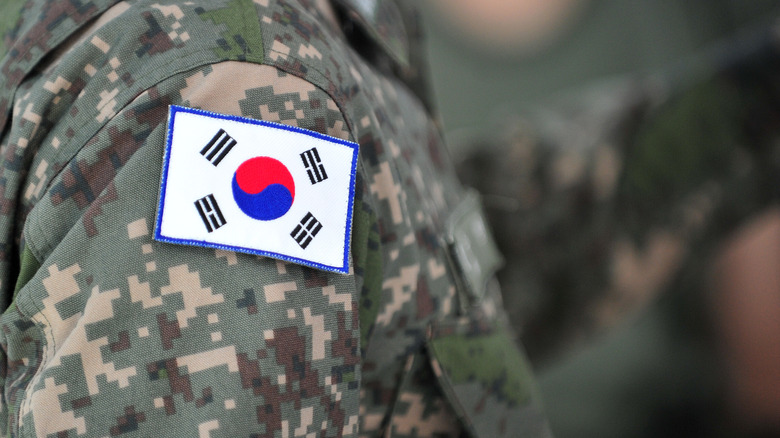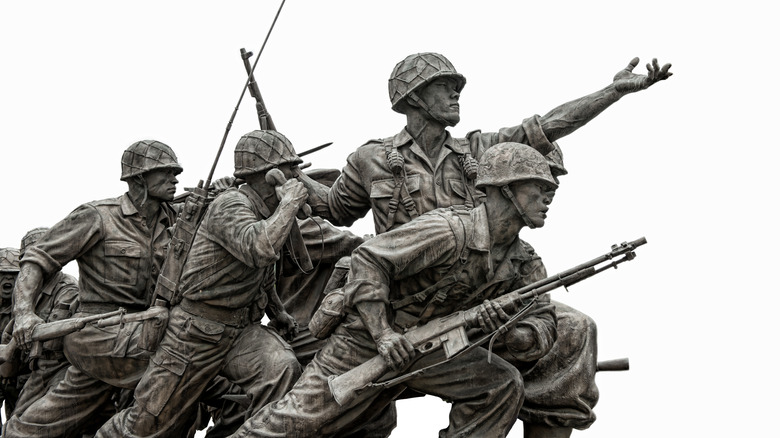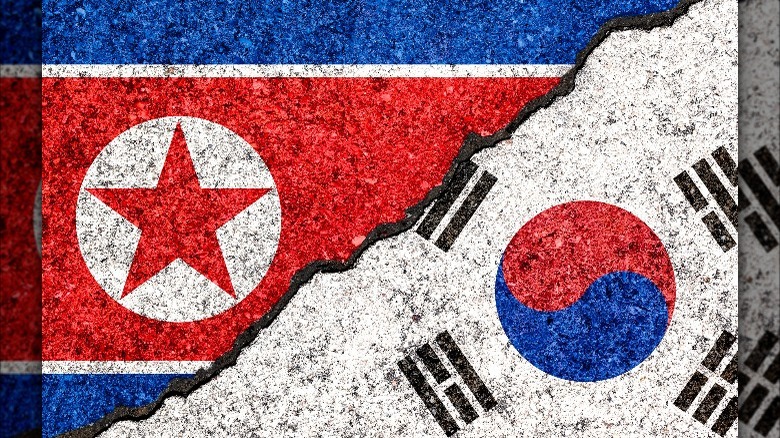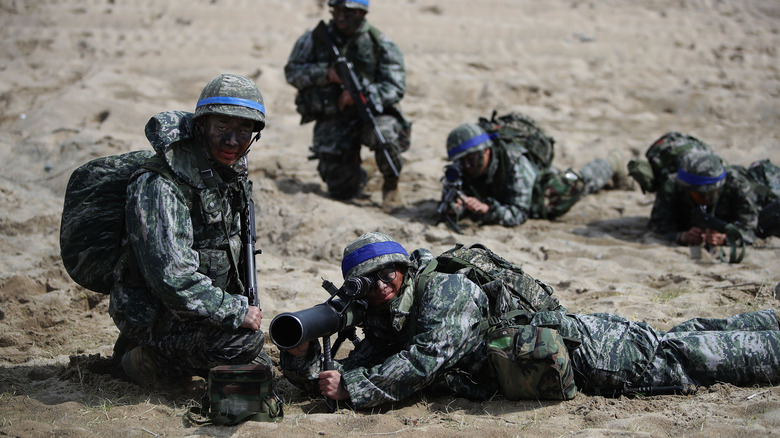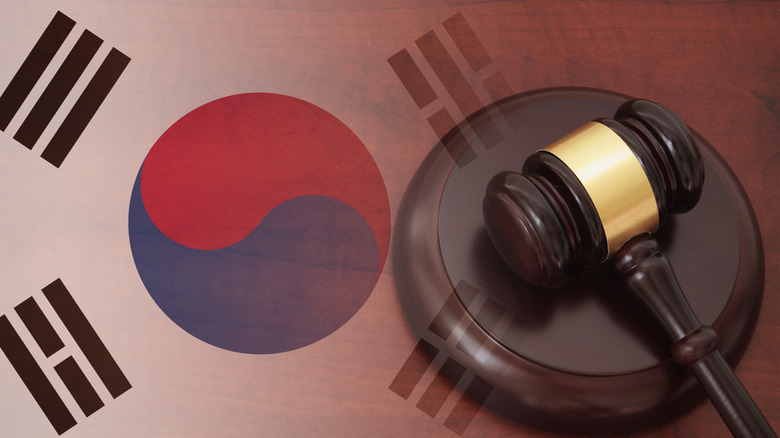The History Of South Korea's Mandatory Conscription
Since 1392, the Chosŏn dynasty ruled the Korean peninsula. However, in 1910, the Japanese annexed the country, and Korea became part of Japan until the latter surrendered to the Allied forces at the end of World War II in 1945. It was then that Korea was split into two regions at the 38th parallel, which was supposedly a temporary divide. The U.S. occupied the southern part, while the Soviets took over the north. According to Thought Co., elections were supposed to take place in 1948 to reconcile the two regions, but the lack of trust and political differences between the Soviets and the Americans prevented it from happening. The peninsula was divided into two governments: the Republic of Korea (South Korea) and the Democratic People's Republic of Korea (North Korea).
The Korean War began in 1950 when 75,000 North Korean soldiers invaded South Korea in an attempt to unify the two regions under communist rule. Attacks were carried out back and forth between the two regions until 1953 when U.S. President Dwight Eisenhower signed an armistice, but the nations remained divided. Technically, North Korea and South Korea are still at war and are in a frozen conflict (via The Conversation). The ongoing tension between the two nations is one of the main reasons why South Korea has a mandatory conscription law.
Military service in South Korea
According to the Military Manpower Administration, conscription has been in place since the Goryeo dynasty, which began in (918 to 1392). Back then, the nation had regular army personnel as well as reserve forces in preparation for attacks from other countries. Anyone between the ages of 16 and 60 was enlisted, whether man or woman. However, they were free to live their regular lives and were only called for service in the event of an emergency.
Conscription regulations were changed during the Chosŏn dynasty to include only males aged between 16 to 60, and they were called to serve even when there was no invasion. Several more changes were established over the years, and the basis of Korea's modern conscription system was established in the early 1900s. However, that was void when the Japanese annexed the peninsula in 1910. Today's conscription law is noted in South Korea's Military Service Act as part of the constitution written in 1948 which states, "Every masculine gender of the Republic of Korea shall perform military service, as prescribed by the Constitution of the Republic of Korea" (via Korea Legislation Research Institute).
Military forces in North Korea and South Korea
Both North Korea and South Korea are part of the top 10 countries with the largest active military personnel based on 2022 data. China is in the top spot with 2 million, North Korea is ranked No. 4 with 1.2 million, and South Korea is at No. 8 with 555,000 (via Statista). A side-by-side comparison from Global Firepower shows each country's manpower, firepower, land power, and naval power. While North Korea's active military personnel is more than double that of South Korea, the latter's available manpower is 25.9 million as opposed to North Korea's 9.2 million.
South Korea has the advantage when it comes to total aircraft power, but North Korea has more naval fleet strength with 450 to South Korea's 234. When it comes to land power, North Korea's advantage lies in tank strength, while South Korea has more towed artillery, self-propelled artillery, and armored vehicles. Regarding finances, South Korea's 2022 defense budget was listed as $46.3 billion compared to North Korea's $4.5 billion.
South Korea's mandatory conscription
All able-bodied Korean males are required to serve in the military (navy, army, or air force) for at least 18 months. They can enlist as soon as they are 18 years old, but are allowed to complete their service until the age of 28, as reported by The Washington Post. Women, on the other hand, are welcome to volunteer in active or reserve services. Most men, as noted by 90-Day Korean, opt to complete conscription in their early 20s, often taking a break from their university studies to enlist. However, some choose to complete their studies first before doing their duty to their country.
Dual citizens are required to serve in the military, unless they renounce their Korean citizenship before March 31 of the year they turn 18 years old. If they fail to do so before that time, they must fulfill their military duties in order to choose their citizenship or wait until they reach the age of 38, according to Dual Citizenship Report.
Gene Kim shared his experience when he joined the military in 2009. He said that it was a difficult experience to be isolated from society, and the five-week training was intense. "They intentionally try to intimidate you, try to scare you, in order to make you into a soldier," he said (via Insider). Kim also shared one of the sayings in the military, "If you can't make it work, make it work."
Exemptions from mandatory conscription
There are some exemptions to South Korea's mandatory conscription law. A physical exam is one of the requirements before entering the military, and if deemed in ill health, they are placed on non-active duty and carry out services for the government to complete their service or are completely exempt, depending on the severity of their health condition, as reported by 90-Day Korean.
Highly-skilled professionals may also be exempt from service. For instance, professional athletes who have won global awards and classically trained musicians who have brought prestige to the country are exempted from the military if they are recommended by the Minister of Culture, Sports, and Tourism (via ABC News). There has been a long-standing debate about whether or not mandatory conscription should continue in South Korea. Some see it as an important part of tradition and fulfillment of duty to the country. On the other hand, some say it's an outdated law that should be changed, as noted by The Interpreter.
Consequences of failing to report for conscription
Although mandatory, not everyone is keen on reporting for conscription. According to Korea Now, about 19,000 South Koreans have objected to mandatory conscription since the 1950s. These objectors were given a jail sentence of18 months as a consequence of not adhering to the law. Most of them include those who refuse to enter the military because of their religious beliefs as Jehovah's Witnesses. However, that changed in 2019.
As reported by Amnesty International, conscientious objectors were given an alternative, but it was seen by many as a form of punishment. Instead of 18 months in jail, objectors are required to work in jail for three years in administration, laundry services, or kitchens. Their work is monitored, and they reside in the jail and are only given a few weeks of break. Apart from the consequence, objectors are often seen as social pariahs for the rest of their lives. In a 2021 Gallup Korea poll, as reported by Yonhap News Agency, 43% of South Koreans were in favor of voluntary military service, while 42% voted for maintaining mandatory conscription. The remaining 15% refused to answer.
